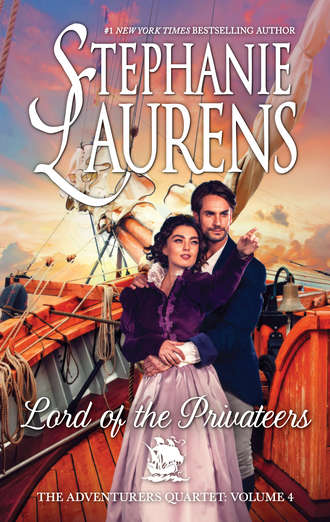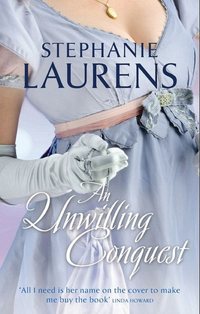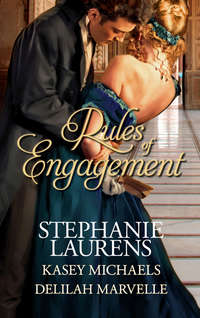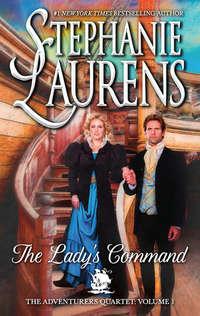
Полная версия
Lord Of The Privateers
She hadn’t lived up to his dreams—the dreams that had kept him alive, his skills and talents honed and focused, through all the preceding hellish months.
He’d wanted to hurt her as she had hurt him—so he’d walked away and left her.
He hadn’t appreciated then what he’d been walking away from—not just a son but the one woman—the only woman—with whom he would ever contemplate sharing his life. His soulmate. His younger self hadn’t understood the magnitude of all that title encompassed, but he’d always known that she was his—his other half, his anchor in life’s storm.
He’d been adrift from the moment he’d turned his back on her.
With the benefit of the years and the wisdom of hindsight, he could admit that, if she hadn’t behaved as he’d expected, equally he hadn’t lived up to her expectations—what most would consider entirely reasonable expectations—of a handfasted partner, either. But because they were soulmates, he’d expected her to overlook his shortcomings and for all between them to be exactly as it had been when he’d sailed away.
He hadn’t known about Duncan—hadn’t known she’d borne his child alone. She would have been surrounded by her family, but she hadn’t had him.
And he knew her well enough to comprehend that more than anything else, his absence then was a large part of what had pushed them apart.
He wanted her back—he’d already decided that. Learning of Duncan only strengthened his determination. Duncan was his. He wanted the boy openly acknowledged and legitimate. Reclaiming her would achieve that, too.
Reclaiming Isobel was the route to the future he was now adamant he wanted and needed.
He—they—had wasted eight years; he wasn’t about to waste any more.
But getting her back wasn’t going to be easy. She would be prickly, barricaded; he would need to undermine her defenses one by one.
A sliver of her profile was all he could see. He studied it, then said, “Tell me what happened eight years ago from your point of view. What happened after I left?”
Over her shoulder, she threw him a brief, frowning glance.
After fleetingly meeting his eyes—and confirming he was, as she’d supposed, in earnest—Isobel faced forward. Why had he asked that? Long inured to his silences, she’d waited, every nerve tense, ready to engage and defend in whatever way his attack, when it came, might require...but that?
She’d jettisoned any notion of keeping him at a distance while she re-evaluated their situation. Duncan’s appearance had put paid to any chance of not explaining all to Royd. She couldn’t in all conscience refuse to answer his questions, not when even she recognized that he had a right to know.
Yet the question he’d asked wasn’t one she’d been expecting. Not phrased in that way. And she knew him; if he wasn’t reacting quickly and instinctively but rather after considered thought, then he would have some goal in mind.
What that goal might be...in the circumstances, she couldn’t even guess.
But he was being reasonable, so avoiding the question wasn’t an option; he was far too canny to give her an excuse to take refuge in her histrionic side. She couldn’t get away with enacting some drama and distracting him, as she could with almost anyone else.
Not with him and not with Iona. All others she could manage, but not those two.
“Very well.” If that was the tack he wanted to take, she would follow and see where it led. “You left three weeks after our handfasting. You told me you expected the voyage to last for a month, two at the most. You sailed away. I went to live with Iona at Carmody Place—she wanted the company, and as we’d handfasted, I no longer needed to live with Mama and Papa and attend balls and dinners. It suited me to go to the Place and not have to bother with society—you know I was never enamored of the social round.” An understatement, yet in drawing back from society, she’d unwittingly laid the groundwork for what came later.
“I settled with Iona, then realized I was pregnant. I was thrilled and so happy.” She’d been over the moon. “I didn’t tell anyone. I thought to wait for you to return to tell you first.” She couldn’t stop her tone growing colder. “But you didn’t return. At first, I just waited, but after three months had passed with no word from you, I went to the Frobisher office and asked when they expected you back. I was told they didn’t know. They smiled and assured me you would return as soon as you could. I left, but went back a week later and asked if there was some way to contact you. I wanted to send you a letter, but they explained that there was no way to get any message to you at that time. And they confirmed they hadn’t heard anything from you anymore than I had.”
She paused, feeling the memories draw her back and pull her into the roiling vortex of emotions she’d experienced then. “A week later, I went back and asked them how, given they’d heard nothing from you or any others on your ship, they knew you were still alive. They hemmed and hawed and, ultimately, admitted that they didn’t precisely know, but as they hadn’t heard otherwise... In short, they couldn’t confirm that you still lived. All they would say was that they were sure you would eventually turn up. Needless to say, I wasn’t reassured.”
“You didn’t speak to my father or any of my brothers?”
“Your father was out of town at the time, and I think Robert, Declan, and Caleb were at sea.” She hesitated, then asked, “Would I have got a different answer if I’d asked them where you were?”
She shifted her head enough to, from the corner of her eye, catch his grimace. After a moment, he replied, “Probably not from my brothers. But my father might have...understood enough to reassure you.”
“Hmm. Well, he wasn’t there.” She looked forward again. “And while I did think of speaking to your mother, she was off with your father. And later... By the time your parents were back in Aberdeen, I’d rethought things.”
“What things?”
If he’d sounded demanding, she might have found it more difficult to go on. As it was, he was still Royd, the one person in all the world she’d unreservedly shared her thoughts, wishes, and dreams with, once upon a time. The link—the connection—was still there; she could tell him anything. Even this. “Things like why you’d wanted to marry me. I realized that it wasn’t as I’d supposed—that I’d been naive in ascribing to you the same motive that applied to me.”
Even though she now viewed that time from the insulating distance of eight years, and she had—she firmly believed—come to accept the reality, the surge of remembered devastation still swamped her. Not having to meet his eyes helped. Allowed her to draw breath and reasonably evenly say, “I always knew I was an unlikely princess to your prince. I was too tall, too...unfeminine in so many ways. Not least in my aversion to feminine pursuits and my determination to succeed in being allowed to build ships.”
She paused, then, as calmly as she could, went on, “As you know, I was told from an early age by supporters and detractors alike that the only reason any man would seek to marry me was to gain control of the shipyards.” She raised one shoulder in a slight shrug. “I’d thought you were different, but when you stayed away and didn’t even write, I realized I’d misread things. I’m sure you recall it was Iona who insisted on us handfasting and not formalizing a marriage immediately. She’d seen the truth that I hadn’t.” Blindly, she gestured toward him. “And of course, you, as the future head of Frobisher Shipping, had the greatest incentive of all to want to gain control of the Carmichael Shipyards.” Despite her best efforts, the breath she drew shook, but she clung to her dignity and went on, “As I wanted more from marriage than you were able to give, I realized I couldn’t go forward and formalize our marriage. Once I’d reached that understanding, there was no reason to do anything other than wait to tell you if you ever got back.”
Royd stood behind the woman who, despite the years, still held his heart, and felt as if he’d been turned to stone. He’d known of her belief that she wasn’t attractive, and that her temperament made her unsuitable to be any gentleman’s wife—ergo that no gentleman would offer for her hand other than to gain control of the shipyards. He vividly recalled the day he’d gone to meet her at the yards, but hadn’t been able to find her. He’d been certain she was there somewhere, so he’d hunted, and eventually, he’d found her hidden away on a perch overlooking the ribs of a hull in production. She’d been hunched in on herself and had been, if not actively crying, then deeply upset; he’d had to tease the reason for her uncharacteristic downheartedness from her, but in the end, she’d told him—gifted him with—the raw truth. The truth as she’d seen it—the same truth she’d just handed him, but then, she’d been all of fourteen.
Despite the difference in their ages, at that time, she’d been as tall as he, all long limbs and bony elbows and knees. He remembered that girl quite well.
He’d talked her around, convinced her that she didn’t need to worry about any gentleman marrying her—that everything would change by the time she was ready to walk down the aisle.
Even then, he’d intended to be the man waiting to meet her at the altar.
It had never occurred to him that that fragile and vulnerable girl of long ago still existed inside the confident, exuberant twenty-year-old young lady he’d handfasted with, much less inside the woman she now was.
Didn’t she have a mirror?
But no—he knew perfectly well that if one was convinced of a truth, one didn’t necessarily see reality. He’d used that human failing to his advantage many times over the years. He’d been actively doing exactly that—letting people think they saw what they expected to see—while she’d been giving birth to his son.
How to open her eyes...especially given that Iona would have held up his behavior of eight years ago as proof of his motives for marriage? Her grandmother had always viewed him and his involvement with Isobel askance. And he couldn’t argue that he wasn’t the prime candidate for wanting control of the shipyards; he was.
Yet that had never figured in his determination to marry Isobel. If she had nothing whatsoever to do with the shipyards, he would still want to marry her.
Intellectually at least, he—with the help of others—could convince her that, even by the age of twenty, her ugly duckling had transformed into a swan. But with her, that was only half the problem, and over the years, the other half—her unfeminine behavior and her devotion to and passion for the active practice of shipbuilding—had only grown more real, more confirmed, more blatantly a part of her.
And for the very same reasons she’d believed he’d wanted to seize the shipyards via marriage, he would never urge her to change her involvement in shipbuilding. Put simply, she and her talents and skills were far too vital to his and Frobisher Shipping’s future.
He wanted her as she was—on every count.
All those thoughts reeled through his brain at mind-numbing speed. He felt pummeled by realizations, but he was too experienced to leap into actions that might prove counterproductive.
Winning Isobel again—claiming her again—was a battle he needed to approach with all due caution.
He focused on the sliver of her face that he could see, faintly lit by the ship’s running lamps. Simply telling her the truth—his version of the truth, the real truth of why he’d wanted to marry her...would she believe him? He doubted it; putting himself in her shoes, based on what she currently knew, he didn’t think he would believe him, either.
When she’d dismissed him so decisively and refused to see him again, he’d walked away and done his damnedest to appear unaffected and unconcerned, especially in ways he knew were likely to be reported back to her. Behaving openly as if her dissolving their handfasting hadn’t bothered him had been his way of striking back, and he had a lowering suspicion he’d succeeded all too well. He usually did.
He’d screened his true feelings from everyone—too hurt and, yes, too wounded not to. Attempting to rewrite the truth he’d encouraged not just her but everyone else to believe wasn’t going to be any easy matter.
One fact, however, was now crystal clear. She’d hidden Duncan from him as a direct consequence of him knowingly concealing a significant section of his life from her.
The eight years they’d spent apart, the nearly eight years of Duncan’s life he’d missed, were the price he—and unwittingly she and Duncan—had paid for him keeping a secret mission secret.
He could swear and rail against a Fate that had conspired to so tangle them in their own strengths and weaknesses, their own vulnerabilities, but to what end? They were where they were now and had to go forward from there.
The past was the past. They needed to put it behind them and move forward.
In that order.
She was comfortable with his silences; few were, but she remained patiently waiting—one of the few things about which she’d learned to be patient.
She knew him better than anyone else in the world. He was fairly certain she still felt something for him, but he didn’t feel confident as to what that something was. Not now. Still, she was a passionate woman, yet she hadn’t encouraged any other man. As far as he’d heard—and when it came to her, he’d kept his ear to the ground—she’d never taken any other man to her bed. Why was that if not...?
An alternative answer came with his next heartbeat. She hadn’t taken up with any other man because of Duncan. Because, according to the laws under which they’d handfasted, she was still plighted to him—Royd—even if he hadn’t known it.
Another realization buffeted him.
He narrowed his eyes on her face. “You’ve been waiting for me to marry.”
“Obviously.”
He managed not to snort. As if that was going to happen. He’d long ago accepted that he wouldn’t be marrying anyone else; for him, it had always been her or no one.
As things stood, that also meant that for her, there would be no one. Or at least, no one else.
Not unless he agreed to release her from their troth.
He couldn’t imagine doing that, certainly not while any hope of rewinning her remained.
Had she really believed...?
As if reading his mind, she added, “Once you married, I intended to approach either you or your wife and petition you to release Duncan formally into my care.”
He bit his tongue against the impulse to inform her that, regardless of the circumstances, once he’d learned of Duncan’s existence, he would never have let the boy go; he’d known his son for only a few hours, yet he knew he’d fight anyone who thought to separate them again. Yet although she wasn’t normally skittish, this unexpectedly vulnerable Isobel required careful handling. Even under normal circumstances, her ability to surprise knew few bounds.
Insistently, his mind returned to her earlier words—I’d been naive in ascribing to you the same motive that applied to me—and the revelation by implication buried therein.
What had been her motive in handfasting with him?
Was it what he’d always believed it to be?
And did that mean she still loved him?
He couldn’t be certain and was long past taking anything about her as a given. Regardless, could she come to love him as she once had?
He reviewed the tangled skeins of their lives and had to believe that there was a real chance of that—that it was definitely a possibility. But the human heart was such a complex organ, and love could be impacted by so many other factors.
One conclusion stood out, one absolute in the morass of uncertainties. He wanted her to love him again with the same wholehearted—wild and open-hearted—passion she’d once lavished on him. And he wanted that with a desperation that reached to the bottom of his soul.
He was a renowned strategist. This might not be his usual sort of mission, but he had to believe he could pull it off.
He had to believe she hadn’t ceased loving him, but rather, his behavior as she’d interpreted it had caused her to lose faith in him, trust in him, and she’d drawn back. His behavior, all unwitting on his part, had caused her old vulnerability to rise up, and she’d withdrawn and barricaded herself against him.
His behavior as she’d perceived it was his first problem—the first issue he needed to address.
Inwardly, he grimaced. She’d trusted him implicitly, from the bottom of her heart, from her earliest years. In acting as cavalierly as he had, he’d taken that trust for granted; he hadn’t honored the reality that trust needed to be reciprocated, needed to be earned and deserved. By not telling her the truth of where he was going and why, and never explaining his prolonged absence, he’d broken her trust.
Irreparably?
He hoped not. Had to believe not.
Where trust had once been, surely it could be built again.
He had to believe that; he had no other choice and no other way forward. He needed to rebuild her trust in him before he would have any chance of reclaiming her love.
And in rebuilding her trust, he had to ensure he never, ever led her to imagine that he might assert his rights and effectively force her into marriage. Another man less wise in her ways might use the hold he now had over her via Duncan to force her to the altar, but any step in that direction would result in immediate resistance—she would fight him every step of the way, and so would her family—but more critically, such a move wouldn’t gain him what he wanted. He wouldn’t regain her love and all that went with that.
He pushed away from the ship’s side, caught her hand, and drew her around. “Come below. There’s something I want to show you. Something you need to read.”
He didn’t have to glance at her to know she frowned at him—but she obliged and, despite her start, instantly suppressed, when his hand had closed around hers, didn’t pull away but allowed him to tow her back to the aft hatch. He opened it and, releasing her, waved her through, then followed her down the stairs.
He nodded past her as he joined her in the narrow corridor. “The main cabin.”
Isobel led the way into the stern cabin. Immediately, she crossed to the connecting door to the cabin on the left. She looked in, saw Duncan’s face faintly flushed in sleep, and gently shut the door.
“Will our voices disturb him?” Royd had paused by the side of the desk.
She shook her head. “He’s a sound sleeper.” Even more so than you.
As if he’d heard her unvoiced comment, Royd humphed and continued to the large, glass-fronted bookcase built into the wall to the right of the desk. He opened the doors and reached to the second-highest shelf. His long fingers skimmed the spines of the narrow volumes packed along the shelf’s length, then his hand halted, and he eased one slender volume from the rest.
He closed the bookcase doors, turned, and held out the book. “I believe you’ll find the contents of interest.”
Premonition tickled her spine. She approached and took the book from him. It appeared to be a journal. “What is it?” She turned the book in her hands and opened the cover.
The date leapt out at her, inscribed in his strong, blatantly masculine hand. February 24, 1816. The day after he’d fatefully sailed away. She stilled. She sensed—knew—that he’d put the answer to her most vital question into her hands.
“It’s an account of the mission I sailed on, the one that unexpectedly kept me from home through 1816 and into 1817. It’s all there—just bare bones, but if you want to know more on any point, ask, and I’ll explain.”
When she looked up at him, feeling again as if the world was rocking independent of the waves, he met her gaze, but she could read nothing at all in his expression.
He tipped his head toward the desk. “Sit. Read. Once you’ve finished, if you wish to read any of the others”—he gestured to the bookcase—“feel free.”
Returning her gaze to the journal, she sank against the front edge of the desk.
He crossed to the main door, but paused with his hand on the latch. When she glanced at him, he said, “It just occurred to me...the mission that separated us is similar in many ways to the one we’re presently on.” Before she could ask what he meant by that, he nodded at the book in her hands. “Read that first. I’ll tell you the rest later.”
With that, he opened the door, stepped out, and quietly shut the door behind him.
She stared at the panel for several seconds, then looked down and refocused on the journal’s first page.
Royd entered the cabin he’d moved into. He shrugged off his coat and hung it up, then started unknotting his cravat.
With something this important—the rescripting of their pasts with a view to shaping a shared future—a wise man would take his time and set each foundation stone properly and securely in place.
She didn’t yet know it, because he hadn’t yet explained, but they would be stopping in London for several days—possibly as long as a week. Then would come the voyage to Freetown, whatever action awaited them there, and the voyage back to London, and eventually, the journey home to Aberdeen. He had weeks—possibly as many as five or even six—in which to execute his campaign.
His quest to win Isobel Carmody Carmichael again.
* * *
Isobel read far into the night. Royd’s journal didn’t just cover the events of his long-ago mission but also included snippets of his personal life. As well as learning what had kept him from her for more than thirteen months, she read of his frequent wish to send word to her, an act he drew back from again and again.
Finally, she reached the end of the volume and laid it aside. Having her world as she’d known it turned upside down for a second time in one day was exhausting; she fell into a deep, dreamless sleep.
She didn’t re-emerge onto the deck until the morning was well advanced. On waking late, she’d been unsurprised to find herself alone in the stern cabins; she’d breakfasted in solitary state while sampling some of the other volumes in the bookcase—some earlier, some later.
Most of Royd’s missions—for the voyages detailed in the journals were transparently that—had been short, only a month or two. A few had stretched for nearly a year. Some had occurred during the late wars, while others had been more recent—after she’d ended their handfasting.
Of those later missions, certain of the details he’d jotted down in nonchalant vein would have induced panic if she hadn’t known he was still hale and whole. He’d always harbored a certain disregard for danger—a trait she in large part shared—yet some of his actions in those later missions seemed ridiculously risky, even for him.
Via the logs filling the third shelf of the bookcase, she’d confirmed that, in between missions, he’d sailed on Frobisher company business, ferrying personages of wealth and influence—often royalty—across various seas. Those were the voyages she and others in Aberdeen, and no doubt elsewhere, knew of and associated with Royd Frobisher.
The missions were something else entirely.
She’d led a relatively sheltered existence, yet even with her limited knowledge, she could imagine just how dangerous some of the undertakings he’d been involved in must have been.
Last night, he’d intimated that this voyage was a mission similar to the one that had disrupted their handfasting.
Even more than a need for fresh air, curiosity sent her up on deck. She took several of his journals and logs with her. One glance confirmed that he was at the wheel, and that Duncan stood by his side, the wind whipping his hair about his eager face. She returned her son’s wave—and returned Royd’s sharp look with a noncommittal nod—then headed for the bow.
A triangular bench filled the bow’s tip; the spare anchor was stored beneath it. She climbed up, wedged her shoulders between the gunwales, and settled to read; the more she learned about the man she’d thought she’d known but evidently hadn’t, the better.











